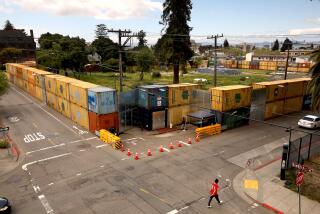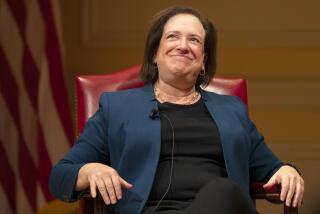Preliminary Work on Unocal Plants Is Unauthorized, EPA Says : Environment: Building of the refineries will continue, company says, because construction had received approval from the AQMD. The controversy shows differing interpretations of the Clean Air Act.
For the second time this month, a major oil company, Unocal Corp., has fallen afoul of the federal environmental bureaucracy in the process of trying to manufacture cleaner gasoline to comply with federal law.
Last Friday, the U.S. Environmental Protection Agency notified Unocal that it was violating the Clean Air Act by doing preliminary construction work on low-emission gasoline plants in Carson and Wilmington before building permits were issued. Unocal officials responded that the work--laying foundations--had been approved by the South Coast Air Quality Management District, the agency responsible for issuing the permits.
A Unocal spokesman said the company plans to continue the work despite the EPA’s notice of violation.
“At this point we are proceeding with the work because we think we are in full compliance with the law,” company spokesman Barry Lane said. He said AQMD inspectors had visited the construction sites more than once since the work started and had given their approval.
Earlier this month, the EPA sought to shut down a reformulated fuels project being built in El Segundo by Chevron USA. Like Unocal, Chevron lacked a permit but had the AQMD’s consent.
But a federal appeals court blocked the shutdown, and the AQMD subsequently issued Chevron the necessary permit. However, EPA spokeswoman Virginia Donohue said Tuesday that the agency is seeking to impose fines on Chevron for the work it did before receiving the permit. “We intend to go to trial over that issue,” Donohue said.
Donohue said the EPA has not decided whether to take similar action against Unocal. “We have to look at what steps we are going to take next,” Donohue said.
She said the agency could seek to fine the company up to $25,000 per day from the time work began Sept. 27 until permits are issued by the AQMD. The permits could be issued as early as next week, according to an AQMD spokesman.
The Chevron and Unocal facilities are being built to meet a 1995 EPA deadline for manufacturing cleaner-burning automobile fuel.
“The Congress has mandated reformulated fuels,” Roger C. Beach, Unocal president and chief operating officer, said in a news release issued Tuesday. “It is ironic that the EPA seems to want to stop us from complying with that mandate.”
As with Chevron, the dispute with Unocal appears to have been triggered by a union that is angry over the oil company’s employment practices.
Thomas Adams, a San Mateo lawyer representing a Los Angeles pipe fitters local, said he had notified the EPA and AQMD that Unocal began work without permits. A similar complaint by Adams to the EPA about Chevron led to the shutdown order.
In the case of both companies, Adams said, the union objected to hiring of out-of-state, non-union workers. But he also said the union had protested the construction activity because it posed environmental hazards to workers and neighbors.
The controversy shows that the EPA and AQMD have different interpretations of federal clean air regulations and whether limited construction work can take place before permits are issued. The permits typically spell out the environmental risks posed by the construction and any mitigation efforts a company must undertake.
“Our position is, the sooner they get these facilities operating, the sooner we’ll be breathing cleaner air,” said Bill Kelley, an AQMD spokesman. “Since the environmental impact process is a lengthy one, we have said: ‘Go ahead and do some site work as long as you don’t hook anything up or take anything to the point it can be operational.’
“We have also said that if, at the point of issuing the permit, we find that you have to go back and change something you have done for environmental reasons, that’s a risk you’ll have to take.”
But Bill Glenn of the EPA said his agency believes that “construction of any project that can significantly increase people’s exposure to unhealthy air cannot begin until all of the environmental impacts have been reviewed and proper pollution controls have been identified.”
More to Read
Inside the business of entertainment
The Wide Shot brings you news, analysis and insights on everything from streaming wars to production — and what it all means for the future.
You may occasionally receive promotional content from the Los Angeles Times.










